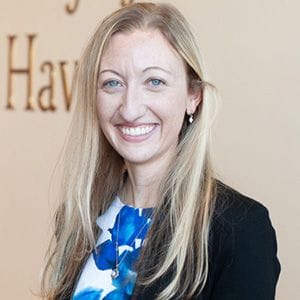In this interview, Dr. Horvat discusses her latest research article and how her institution's read and publish agreement with ACS helped her publish open access seamlessly and free of charge.

As part of an ongoing series here on ACS Axial, we’re interviewing authors and librarians from around the world to find out more about their research, their published work, and the impact that open science is having on a changing landscape of research communication. This time, we talked with Dr. Kristine Horvat, Assistant Professor at the University of New Haven.
We need to read others’ works to get ideas...Open access opens those doors, especially to researchers at smaller institutions.

Hello, Dr. Horvat—could you tell us a little about yourself and your current research focus?
My focus is on low carbon energy, and various facets associated with that. The first part is gas hydrates which occur naturally around the world. There are hundreds of thousands of cubic feet of methane in hydrates, and I'm researching their extraction for energy. But to make the process more low carbon - closer to net zero - there's interest in sequestering carbon dioxide while extracting methane, so I'm working on that too. Finally, I also research algal biofuels - finding ways to dewater and extract oil from algae, or ways to ferment algae to make bioethanol.
You recently published Dewatering Chlorella Algae Through Carbon Dioxide Hydrate Formation. How would you summarize the work in that article for someone unfamiliar with the area?
The paper combines my two research areas, because it was looking into using carbon dioxide gas hydrates to dewater algae into a slurry. We tried several different experiments to see how much water we could remove from an algal slurry to form gas hydrates.
Your article was published in ACS Sustainable Chemistry & Engineering. How was the experience?
I thought the editorial process for ACS Sustainable Chemistry and Engineering was great. It only took around a month or so to review the paper and get back to me. They gave me about a month each time to send in corrections. It was just perfect timing. I think it took about 6 months from start to finish, which I feel is pretty efficient.
What kind of impact do you think your paper has had so far?
It's a relatively recent paper; it only came out last month, so it's perhaps a bit too early to say.
The article was published under your institution's read and publish agreement with ACS—how did you find out that this was available?
At first I didn't plan to publish the article as open access, as my university doesn't normally fund open access publishing charges. But then when I'd had my article accepted, ACS mentioned that we could publish OA for free because I’m based at a primarily undergraduate institution, which was fantastic. The ability to publish open access at no cost was incredible.
What are your thoughts on open access as a concept?
I think open access is such a great way for people to learn about research without needing to negotiate a paywall, especially for researchers at smaller institutions, or members of the public who are interested in the topic and want to learn more.
Some of my previous co-authored papers might be available open access, but this was my first time going through the open access process as corresponding author. I would very much prefer all papers to be open access; the cost is the only obstacle.
I've worked at a big R1 research-intensive institution before, and practically any paper that you wanted to read was instantly available to you. At my current institution you have to request an article and then wait a day for it to be delivered. The process works, but if I want to read that paper now, it doesn't really fit the workflow. It's not as fast to just find a piece of information, especially if the abstract makes you think it fits your needs but the full paper doesn't quite match. Open access helps speed up access to important information.
Where do you see the open science movement in 10 years' time?
I hope that open access is more prevalent, and that publishing fees go down for places where there aren't agreements like the one that I have at my institution. I know it costs a lot to publish these articles, so I understand why those fees exist, but just having more open science is the goal. We need to read others’ works to get ideas, and to see if what we're doing is novel and not a repetition of prior research. Open access opens those doors, especially to researchers at smaller institutions.
Finally—what do you think you'd be doing if you weren't a researcher?
I definitely think I would still be involved in academia, maybe with more of a focus on teaching which I'm very passionate about. I do some educational research as well, and I love interacting with students and involving them in research projects. If I couldn't have that research side, I would probably be mostly in the classroom trying to come up with new teaching techniques.
Check out the other interviews in this series:
Ian Cousins, Stockholm University
Hongxia Duan, TU Eindhoven
Vojtěch Vaněček, Institute of Physics, Czech Academy of Sciences
Louise Otting, TU Delft
David W. McCamant, University of Rochester
Fernando Sartillo Piscil, Benemérita Universidad Autónoma de Puebla
Lillian Chong, University of Pittsburgh
Sue Cardinal, University of Rochester
Rubén Mendoza-Cruz, Universidad Nacional Autónoma de México
Alison Bradley, Partnership for Academic Library Collaboration and Innovation
Vesna Srot, Max Planck Institute for Solid State Research
Matt McDowell, Georgia Institute of Technology